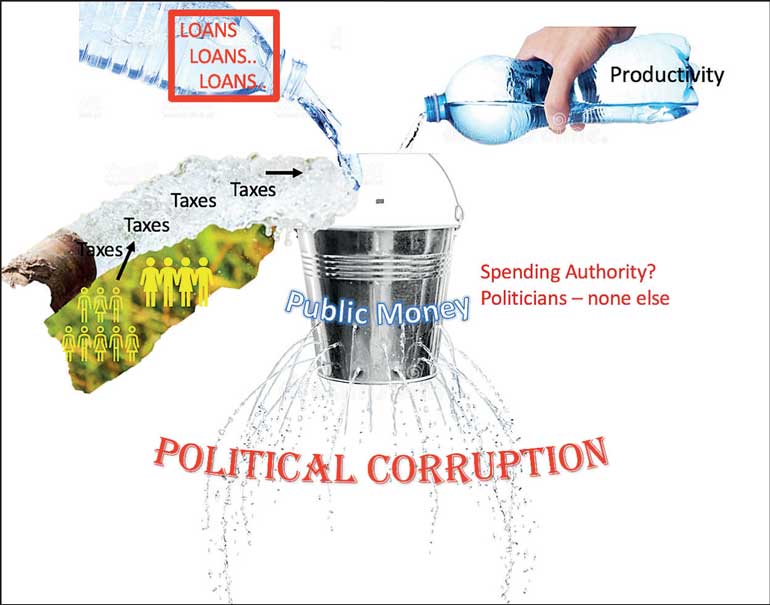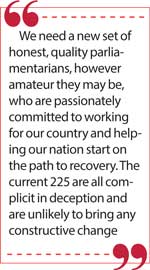Thursday Jan 08, 2026
Thursday Jan 08, 2026
Wednesday, 10 July 2024 00:28 - - {{hitsCtrl.values.hits}}

 Sri Lanka is grappling with a severe cost-of-living crisis rooted in pervasive political corruption. Political intermediaries profit at every stage, shifting the burden onto consumers. The economy has plummeted due to corrupt leaders using the Government to further personal agendas and misusing public funds on unproductive projects while simultaneously selling national assets and depleting public reserves. Under such deceptive governance, our future hard work and increased taxes will be in vain, offering no relief to ordinary citizens as corrupt politicians continue to siphon off surplus funds.
Sri Lanka is grappling with a severe cost-of-living crisis rooted in pervasive political corruption. Political intermediaries profit at every stage, shifting the burden onto consumers. The economy has plummeted due to corrupt leaders using the Government to further personal agendas and misusing public funds on unproductive projects while simultaneously selling national assets and depleting public reserves. Under such deceptive governance, our future hard work and increased taxes will be in vain, offering no relief to ordinary citizens as corrupt politicians continue to siphon off surplus funds.
Sri Lanka’s predicament is akin to trying to fill a bucket riddled with ever-growing holes, as corruption infiltrates all levels of Government—from the president to local representatives. The politicisation of institutions enables political cronies to divert public funds for personal gain. Nearly all politicians engage in some form of corruption, including bribery, lobbying, cronyism, nepotism, parochialism, influence peddling, and embezzlement. This corruption is the root cause of our national problems, including the economic crisis, drug trafficking, and money laundering. Eradicating political corruption will automatically address our debt crisis, reduce living costs, and pave the way for a better future for all of us.
We must recognise that taxes determine how much of our earnings go to the Government and how much we retain for our families. The Government has no money of its own and depends entirely on the people’s earnings. Increased Government spending means borrowing from our savings and foreign sources or raising taxes, with the burden ultimately falling on the citizens. In reality, there is no ‘Government money’; it is all taxpayers’ money. True prosperity cannot be achieved through extravagant public spending programs, and no nation has prospered by overtaxing its citizens. Therefore, ensuring that every rupee collected in taxes is spent wisely for the public’s and the nation’s benefit is crucial. Currently, this remains a distant dream.
Election propaganda
The current election propaganda spending spree exemplifies how foreign associations collaborate with local stooges, reminiscent of past traitors who facilitated foreign colonisation for personal gain, leading to centuries of colonial rule. Although patriotic and passionate citizens secured independence in 1948, today’s political traitors are enabling foreign encroachment through modern tactics, creating severe debt crises and exchanging perks for their benefit at the nation’s expense. The national debt has doubled from $ 51 billion to $ 100 billion in two years, providing no benefits to the public and leaving loan repayments unmet.
In the past, our ancestors valiantly fought against deceptive traitors and foreign forces to protect our culture, assets, and resources. Today, similar issues are resurfacing, with foreign encroachment taking a different form. By exploiting a debt crisis through alliances with traitorous politicians, our nation is being reduced to a “modern slave class,” forced to work endlessly to repay debts while offering national enterprises and assets to foreigners for pittances.
Eradicating political corruption is essential for recovery; otherwise, we and future generations will work like slaves, paying exorbitant taxes to support corrupt representatives and their foreign counterparts who steal and indulge in luxury while neglecting public welfare. For instance, domestic restructuring has depleted about a third of pension funds. Although the IMF intervened for immediate rescue, foreign debt restructuring with IMF assistance appears to come at an exorbitant cost, and our Government seems willing to collaborate blindly without negotiating any significant concessions. It seems our Government is working with the IMF to keep us in a perpetual debt crisis, ultimately benefiting lenders, not us.
It is time for the nation to wake up and take control of the political mafia that caters to foreign interests in exchange for perks, jeopardising our future and turning us into a failed nation. We must empower the civil administration to prevent ministers and their cronies from independently signing agreements on public loans, contracts, national asset dissolution, and selling national enterprises without proper national civil procedures to ensure transparency and assess all risks and benefits. In this 21st century, we must empower legislative acts in the short term to eliminate political corruption entirely, followed by a public referendum for long-term solutions.
Independent five-pillar Government
 By eradicating political corruption with a politically independent judiciary and reformed commissions, we can pave the way for an independent five-pillar Government consisting of the Constitution and Legislature with a Senate, Judiciary, Executive, and Independent Commissions. This structure will oversee the legality of new laws and uphold the Constitution’s supremacy in all aspects of governance, ensuring that the people govern the country in a fully liberal democratic setup.
By eradicating political corruption with a politically independent judiciary and reformed commissions, we can pave the way for an independent five-pillar Government consisting of the Constitution and Legislature with a Senate, Judiciary, Executive, and Independent Commissions. This structure will oversee the legality of new laws and uphold the Constitution’s supremacy in all aspects of governance, ensuring that the people govern the country in a fully liberal democratic setup.
Regardless of their rhetoric, actions, or promises, our politicians continue to deceive, glossing over the issues and making hollow commitments without concrete plans. They rely on catchy slogans and orchestrated rallies, offering mere assurances without detailed explanations. They replace meaningful dialogue with empty platitudes and stage extravagant events, ultimately at our cost, to mesmerise the masses. They are truly accountable for the misery in our economy, deteriorating educational opportunities, poor healthcare, lack of law enforcement, and the rise of organised violence. They never address eliminating political corruption or making the constitution more robust and people-friendly.
Their anti-corruption statements focus on minor corrupt practices in the community, ignoring the ‘mega’ corruption facilitated by and for politicians. They have exploited and continue to exploit racial and religious divisions for their own gain. That is why we need a new set of honest, quality parliamentarians, however amateur they may be, who are passionately committed to working for our country and helping our nation start on the path to recovery. The current 225 are all complicit in deception and are unlikely to bring any constructive change.
Reducing ministerial portfolios to the minimum necessary by aligning their functions, eliminating perks for politicians and their associates, and abolishing ‘duty-free’ privileges will significantly reduce our tax burden. These measures alone will help alleviate our debt crisis by conserving foreign currency reserves and local public funds. Political leaders should be prohibited from unilaterally approving projects that offer them commissions. Such approvals should only be granted with the endorsement of an independent procurement commission. This will prevent the implementation of substandard projects in exchange for personal benefits or commissions to political figures. Furthermore, it will curb the deceptive practices of corrupt politicians who resort to borrowing merely to repay existing debt and create a temporary illusion of progress solely for electoral purposes.
Once political corruption at all levels is eradicated, its positive impact will reverberate across every sector. This transformation will lead to substantial changes: the Government will have greater funds available to raise salaries, and the prices of local produce and imports will decrease without political middlemen who manipulate commissions, over-invoicing, and exchange substandard products at inflated costs, burdening the public. Implementing a meritocratic system in all Government institutions will enhance efficiency, ensuring they become true assets to the people.
These reforms will pave the way for a more transparent and effective governance system, benefiting public administration and the entire populace.
(The writer is not an economist, not a lawyer, not a politician, and can be reached at [email protected].)